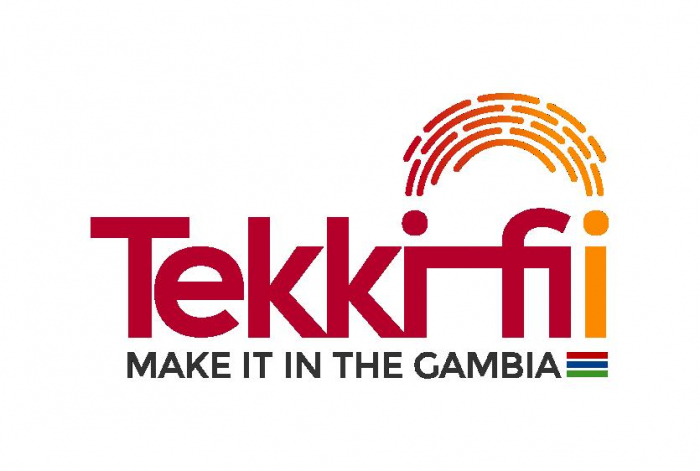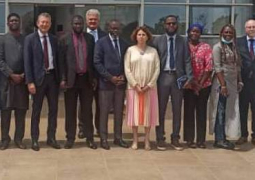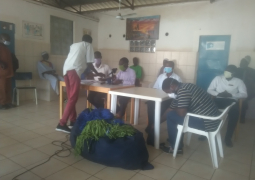
The 3-year project implemented since 2018 by GIZ intends to train 1200 youth in nine market-relevant trade areas ranging from Animal Husbandry to Solar Installation, from Block-Laying and Concreting to Garment Making, Hairdressing and Beauty Therapy. The scheme intends to go beyond just providing the youth with technical skills: it ensures that the TVET graduates combine the acquired competencies with entrepreneurship to start their own businesses.
Neither the private sector nor government can absorb all the young people seeking for jobs once they have completed a full TVET course. This is why GIZ wants to nurture those skills through business development support so that the beneficiaries can become self-employed and also begin employing others. To help them to bridge the unemployment gap existing in the country and ensure a smooth transition towards self-sustenance, training them to set up their entrepreneurship ventures is a deliberate effort of the Teki Fii project implemented by GIZ
“We found the entrepreneurship training very useful to the beneficiaries when they are transiting from training to industry,” explains Momodou Bittaye Head of TVET Component at GIZ. “The scheme helps beneficiaries to start conceptualizing the type of business or income generating activities they would want to work on when they complete their training. Implementing partners have also been encouraged to include the module in their curriculum,” he adds. In fact, GIZ is currently organizing a special training of trainers’ program designed to embed entrepreneurship training both in the apprenticeship schemes and the various TVET courses supported by the Project.
From the second batch of trainees in the TVET centers in the GBA, LRR, and URR, 245 are set to benefit from the next rollout of the entrepreneurship training, accompanied by coaching and business advisory programmes. The entrepreneurship training is a six-day intensive programme where the TVET graduates are exposed to various concepts like business planning, design thinking, negotiation, and marketing skills, while the combination of coaching and business advisory services is a six-month programme geared to help beneficiaries implement their business plan, starting from the very basic steps such as registering their business, opening a bank account for their business, and ensuring regular bookkeeping, among others.
Joseph Jane is a graduate in Satellite Installation from Chamen Skills Training Center. He is one of the 1200 young Gambians being trained within the EUTF-GIZ Tekki Fii project and one among the 30% privileged beneficiaries hoping to transition from TVET centers to the entrepreneurship training programme.
In March this year, 105 trainees were selected for this programme after demonstrating exceptional entrepreneurial skills. Joseph explains: “The satellite industry is very competitive because there are many people who’ve been in this business for a very long time. But one thing that the entrepreneurship training taught me is the fact that we must assess risks and explore all alternative ways of getting our businesses to flourish.” This idea has been working well for Joseph and he has made use of social media to garner as much following and getting people to build interest in his new business idea in the area of satellite installation.
Sait B. Jobe is a graduate in construction and bricklaying from Insight Training Centre. As part of the entrepreneurship training program for TVET graduates, both him and Joseph will later secure grants from the EU-Tekki Fi programme to fully begin operations after registering their businesses. The former has registered his business as “Jane Enterprise”- a Solar installation company whilst the latter as “Almubaram”- a construction company. The expectations that TVET graduates like Joseph and Sait attach to becoming self-employed has made them think outside the box and create their own jobs as soon as they finished their 9-month courses.
Upon the successful completion of their entrepreneurship training, 60 trainees in the Greater Banjul Area (GBA) and Upper River Region (URR) were given a start-up kit worth of D50.000 each, based on merit, to set up their business. “I received materials like drill, satellite finder, spanner amongst other equipment which are essentials in my business and gave me the confidence to start teaching other young people about satellite installation,” says Joseph.
Although Ramatoulie Camara, another TVET beneficiary from Chigambas Training Centre transitioning into business has not received any grant yet, she explains that graduating as a tailor has already improved her source of income. With the hope of expanding her tailoring business, she believes that the lessons learned from the Entrepreneurship training have shaped her business module for the better: “I’m grateful for the design thinking course and business development as these are pushing me to expand my business in the very short term.”
Whilst the three beneficiaries have mapped out ways of becoming key players in their respective fields, the challenges of a changing world affected by a global pandemic and large competition are forcing them to step up their game and keep pushing against all odds.
To further facilitate the passage of TVET graduates from the workshop to the world of business, GIZ is now investing in cooperative management training. The idea behind this initiative is to group young entrepreneurs with the same aspirations, but not necessarily with the same technical profile, into cooperatives or business associations, train them on how to manage a collective business, and coach them through the process to increase their chances of accessing markets and to complement each other’s efforts. These initiatives are meant to enhance employability of the Project’s 5000 young beneficiaries and maximize their chances of forging their own future and “making it in The Gambia”.

Read Other Articles In National News
Rotary Clubs in Gambia celebrate Queen’s Platinum Jubilee Beacons
Jun 10, 2022, 11:42 AM




